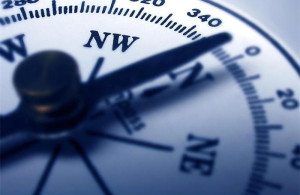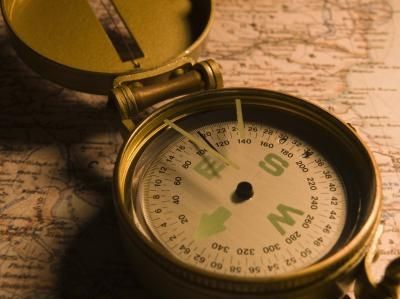 Let’s imagine that you and I were planning a trek through a dangerous and previously unchartered forest out in the middle of nowhere. Yeah, I know that seems unlikely. But, hey, Bear Grylls does it all the time. Why can’t we?
Let’s imagine that you and I were planning a trek through a dangerous and previously unchartered forest out in the middle of nowhere. Yeah, I know that seems unlikely. But, hey, Bear Grylls does it all the time. Why can’t we?
As we survey our pile of “necessities,” we realize that some of it has to stay behind. We can’t take the cell phone (no place to charge it), the radio is too bulky (and probably wouldn’t receive any stations), and we can do without the toilet paper (that’s why God made leaves). One item that we would probably agree that we must take, however, is the compass.
Most adventurers recognize the importance of a compass. Unlike a GPS, it does not lose its signal or drain its batteries. It simply works. Unless someone has set up a huge magnet in the vicinity, it always points north, right?
Not necessarily.
Despite popular opinion, a compass does not point to the North Pole. It points instead to what is known as “magnetic north.” Scientists believe that the earth has an iron core surrounded by liquid metal, which creates a magnetic field that currently appears in northern Canada. Even more confusing, scientists estimate that the magnetic field has moved an average of 10 kilometers per year since it was discovered in 1831, and has recently accelerated to 40 kilometers per year. This means that, in time, your compass needle will not always point to the same place.
Don’t worry. There is no need to freak out if you ever get lost. Your compass points “north enough” to help you find your way out of the jungle. It just won’t do you any good if you’re trying to find Santa Claus.
Does the fact that “north” is not really “north” unsettle you? As humans, we like some things to be certain. If my compass points to the north, I want it to really be north. The same thing every time.
This dilemma serves as an excellent picture of how people try to make their way in the contemporary world. Their moral compasses are set to something that is shifting.
In today’s world we face some very important moral dilemmas. How are we to know what is right and wrong? How are we to determine true moral north?
We attempt to answer this in a variety of ways. Maybe we try to determine what is right based upon what seems to work. You know, “the end justifies the means.” We also try to determine morality based upon our personal preferences. Well, last time I looked at my high school yearbook, I realized that preferences change. And boy, am I glad about that.
We also attempt to determine what is right based upon what is popularly accepted in the world. If everyone’s doing it, it must be ok, right? The problems is that opinions and traditions change over time.
After trying all of these methods for determining what kind of moral choices we should make, we realize that we are attempting to calibrate our compasses to a shifting north. Is there nothing solid upon which we can base our decisions? Is there nothing stable to which we can affix our moral anchor?
Yes, there is. My beliefs are not founded upon what works, what I prefer, or what is accepted in society. They do not originate in “the wisdom of men but in the power of God” (1 Cor. 2:5). God is all-powerful, holy, and eternal. Humans are fickle. God, however, does not change. As the creator, He alone holds the power to determine what is right and what is wrong.
Let’s discard our moral compasses that hopelessly attempt to hone in on a moving target. God is the ultimate moral authority. If we do what He says, we will never stray from true north.
This article appeared in the Bremen Enquirer in my column Connections: Relating the Bible to Everyday Life on Thursday, November 6, 2015.



Another great article, Ben!